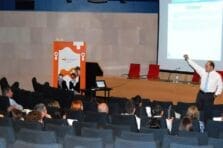La mayor parte de los profesionales que acuden a The Organization Development Institute International, Latinamerica nos pregunta que ES lo que tienen que “saber” para poder “hacer” el trabajo de un consultor de empresa.
Afortunadamente contamos con la contribución del Dr. Donald W. Cole – Presidente y Fundador de The Organization Development Institute – quien ha dedicado desde el año 1968 muchas de sus energías, recursos, conocimientos y capacidades para desarrollar la “Profesión de Desarrollo Organizacional”. Así como las intervenciones que realizan los profesionales en otras disciplinas, como por ejemplo los médicos, requieren de un cuerpo de conocimientos y su efectiva práctica adquirida a través de una primer residencia o concurrencia, las intervenciones de los consultores debieran seguir un proceso parecido.
En los años 60 y 70 las personas que daban sus primeros pasos en los procesos de cambio organizacional eran acompañados por un proceso de coaching o mentoring. Las empresas líderes resguardaban a sus principales directivos y ejecutivos hasta su retiro asignándoles posiciones de staff o de servicio donde prestaban servicios internos de coaching y mentoring a los “nuevos jóvenes de alto potencial”. Y no existían programas formales de Desarrollo Organizacional en las grandes Universidades.
Hoy en día sucede casi exactamente lo contrario. Existen programas formales con Diplomados en Desarrollo Organizacional pero estos profesionales se encuentran con que deben funcionar bajo la opción de “o nada o se ahoga” a que hace mención Edgar Schein. Este contraste – y las eventuales consecuencias negativas tanto para los propios consultores como para los Clientes – es observado con detenimiento por The Organization Development Institute Internacional, Latinamerica.
Y también lo es por The Organization Development Institute. En su publicación “Organizations and Change”, del mes de Agosto del 2004, bajo el título de “Developing an OD Practice”, el Dr. Terry Armstrong (RODC) destaca que es común que las personas que se gradúan en Programas de Desarrollo Organizacional le pregunten con frecuencia “Que es lo que tienen que hacer para iniciarse como un OD Practitioner”. Y una de las conclusiones a que arriba Terry Armstrong es que el proceso de educación formal puede ser necesario pero no es suficiente. Un descubrimiento importante y totalmente revelador de Armstrong sugiere que si uno quiere ser un consultor efectivo y eficiente el foco debe ser puesto en uno mismo. Por lo general los consultores tendemos a ver que el problema o parte del problema es el Cliente y esto es particularmente cierto para aquellos consultores que pregonan una particular “Best Practice” en especial (ver artículo de Eric Gaynor :”Integrando Best Theories con Best Practices” en la página web de The O. D. Institute International, Latinamerica; www.theodinstitute.org).
Por mas de 30 años el Dr. Donald Cole se ha esforzado en el ejercicio de la “Profesión de Desarrollo Organizacional”, lo que lleva implícito las Competencias necesarias para ello. A continuación se incluye una herramienta de auto-apreciación que puede ser usada por los consultores y también adoptada por los directivos y ejecutivos que reclutan los servicios profesionales de consultoría. Los autores de este significativo aporte son Chris Worley, Hill Rothwell & Roland Sullivan.
Esta es una contribución de The Organization Development Institute, por iniciativa de su Presidente el Dr. Donald Cole.
A Self-Assessment Tool for OD Competencies (21st Version)
Supported by Don Cole and created for the Organization Development Institute
By Christopher Worley, William J. Rothwell and Roland Sullivan
Directions: Use this assessment instrument to identify the competencies that you wish to focus on to be more effective as a change consultant. For each competency or work activity area listed in the left column below, circle an appropriate response code in the right column to indicate how much need for professional development you feel you need in this area. Use the following scale for the right column: 1 = No need; 2 = Some need; 3 = Need; 4 = Much need; 5 = Very great need. When you finish the rating, you might use as a discussion tool with your immediate supervisor or other relevant stakeholders to identify areas for your professional development and as a foundation for establishing a professional developmental plan.
1. Be aware of how one’s biases influence interaction 1 2 3 4 5
2. Consult driven by their personal values 1 2 3 4 5
3. Clarify personal boundaries 1 2 3 4 5
4. Manage personal biases 1 2 3 4 5
5. Manage personal defensiveness 1 2 3 4 5
6. Recognize when personal feelings have been aroused 1 2 3 4 5
7. Remain physically healthy while under stress 1 2 3 4 5
8. Resolve ethical issues with integrity 1 2 3 4 5
9. Avoid getting personal needs met at the expense of the client 1 2 3 4 5
10. Solicit feedback from others about your impact on them 1 2 3 4 5
Competency Category: Ability to Measure Positive Change
An effective OD practitioner can…
11. Choose appropriate evaluation methods 1 2 3 4 5
12. Determine level of evaluation 1 2 3 4 5
13. Ensure evaluation method is valid 1 2 3 4 5
14. Ensure evaluation method is reliable 1 2 3 4 5
15. Ensure evaluation method is practical 1 2 3 4 5
Competency Category: Clarify data needs
An effective OD practitioner can…
16. Determine an appropriate data collection process 1 2 3 4 5
17. Determine the types of data needed 1 2 3 4 5
18. Determine the amount of data needed 1 2 3 4 5
Competency Category: Facilitating transition and adoption
An effective OD practitioner can…
19. Help manage impact to related systems 1 2 3 4 5
20. Use information to create positive change 1 2 3 4 5
21. Transfer change competencies to internal consultant or client so learning is continuous 1 2 3 4 5
22. Manage/increase change momentum 1 2 3 4 5
23. Mobilize additional internal resources to support the ongoing change process 1 2 3 4 5
24. Determine the parts of the organization that warrant a special focus of attention 1 2 3 4 5
25. Ensure that learning will continue 1 2 3 4 5
Competency Category: Integrate theory and practice
An effective OD practitioner can…
26. Present the theoretical foundations of change 1 2 3 4 5
27. Articulate an initial change process to use 1 2 3 4 5
28. Integrate research with theory and practice 1 2 3 4 5
29. Communicate implications of systems theory 1 2 3 4 5
30. Utilize a solid conceptual framework based on research 1 2 3 4 5
Competency Category: Stay current in technology
An effective OD practitioner can…
31. Use the latest technology effectively 1 2 3 4 5
32. Use the internet effectively 1 2 3 4 5
Competency Category: Ability to work with large systems
An effective OD practitioner can…
33. Facilitate large group (70-2,000 people) interventions 1 2 3 4 5
34. Apply the competencies of international OD effectively 1 2 3 4 5
35. Function effectively as internal consultant 1 2 3 4 5
36. Demonstrate ability to conduct transorganizational development 1 2 3 4 5
37. Demonstrate ability to conduct community change and development 1 2 3 4 5
38. Utilize a change model to guide whole system change or transformation 1 2 3 4 5
Competency Category: Participatively create a good implementation plan
An effective OD practitioner can…
39. Co-create an implementation plan that is (1) concrete; (2) simple; (3) clear; (4) measurable; (5) rewarded; and (6) consisting of logically sequenced activities 1 2 3 4 5
Competency Category: Understand research methods
An effective OD practitioner can…
40. Utilize appropriate mix of methods to ensure (1) efficiency; and (2) objectivity; and (3) validity 1 2 3 4 5
41. Utilize appropriate mix of data collection technology 1 2 3 4 5
42. Use statistical methods when appropriate 1 2 3 4 5
Competency Category: Manage diversity
An effective OD practitioner can…
43. Facilitate a participative decision-making process 1 2 3 4 5
44. Be aware of the influences of cultural dynamics on interactions with others 1 2 3 4 5
45. Interpret cross-cultural influences in a helpful manner 1 2 3 4 5
46. Handle diversity and diverse situations skillfully
Competency Category: Clarify roles
An effective OD practitioner can…
47. Clarify the role of consultant 1 2 3 4 5
48. Clarify the role of client 1 2 3 4 5
Competency Category: Address power
An effective OD practitioner can…
49. Identify and engage formal power 1 2 3 4 5
50. Identify and engage informal power 1 2 3 4 5
51. Deal effectively with resistance 1 2 3 4 5
Competency Category: Keep an open mind
An effective OD practitioner can…
52. Suspend judgment while gathering data 1 2 3 4 5
53. Suppress hurtful comments during data gathering 1 2 3 4 5
Competency Category: Helping clients own the change process
An effective OD practitioner can…
54. Reduce dependency upon consultant 1 2 3 4 5
55. Instill responsibility for follow through 1 2 3 4 5
56. Collaboratively design the change process 1 2 3 4 5
57. Involve participants so they begin to own the process 1 2 3 4 5
Competency Category: Be comfortable with ambiguity
An effective OD practitioner can…
58. Perform effectively in an atmosphere of ambiguity 1 2 3 4 5
59. Perform effectively in the midst of chaos 1 2 3 4 5
Competency Category: Manage the separation
An effective OD practitioner can…
60. Be sure customers and stakeholders are satisfied with the intervention’s results 1 2 3 4 5
61. Leave the client satisfied 1 2 3 4 5
62. Plan for post-consultation contact 1 2 3 4 5
63. Recognize when separation is desirable 1 2 3 4 5
Competency Category: Seeing the whole picture
An effective OD practitioner can…
64. Can attend to the whole, parts and even the greater whole 1 2 3 4 5
65. Quickly grasp the nature of the system 1 2 3 4 5
66. Identify the boundary of systems to be changed 1 2 3 4 5
67. Identify critical success factors for the intervention
68. Further clarify real issues 1 2 3 4 5
69. Link change effort into ongoing processes of the enterprise 1 2 3 4 5
70. Begin to lay out an evaluation model in the initial phases 1 2 3 4 5
71. Know how data from different parts of the system impact each other 1 2 3 4 5
72. Be aware of systems wanting to change 1 2 3 4 5
Competency Category: Set the conditions for positive change
An effective OD practitioner can…
73. Clarify boundaries for confidentiality 1 2 3 4 5
74. Select a process that will facilitate openness 1 2 3 4 5
75. Create a non-threatening environment 1 2 3 4 5
76. Develop mutually trusting relationships with others 1 2 3 4 5
77. Use information to reinforce positive change 1 2 3 4 5
Competency Category: Focus on relevance and flexibility
An effective OD practitioner can…
78. Distill recommendations from the data 1 2 3 4 5
79. Pay attention to the timing of activities 1 2 3 4 5
80. Recognize what data are relevant 1 2 3 4 5
81. Stay focused on the purpose of the consultancy 1 2 3 4 5
82. Continuously assess the issues as they surface 1 2 3 4 5
Competency Category: Use data to adjust for change
An effective OD practitioner can…
83. Use information to create positive change 1 2 3 4 5
84. Use intelligent information to take next steps 1 2 3 4 5
85. Establish method to monitor change after the intervention 1 2 3 4 5
86. Use information to reinforce positive change 1 2 3 4 5
87. Gather data to identify initial first steps of transition 1 2 3 4 5
Competency Category: Be available to multiple stakeholders
An effective OD practitioner can…
88. Collaborate with internal/external OD professionals 1 2 3 4 5
89. Listen to others 1 2 3 4 5
90. Interpersonally relate to others 1 2 3 4 5
91. Use humor effectively 1 2 3 4 5
92. Pay attention to the spontaneous and informal 1 2 3 4 5
Competency Category: Build realistic relationships
An effective OD practitioner can…
93. Build realistic relationships 1 2 3 4 5
94. Explicate ethical boundaries 1 2 3 4 5
95. Build trusting relationships 1 2 3 4 5
96. Relate credibly, demonstrating business acumen and conversancy 1 2 3 4 5
Competency Category: Interventions
An effective OD practitioner can…
97. Convey confidence in one’s intervention philosophy 1 2 3 4 5
98. Facilitate group processes 1 2 3 4 5
99. Intervene into the system at the right depth 1 2 3 4 5
100. Creatively customize tools and methods 1 2 3 4 5



